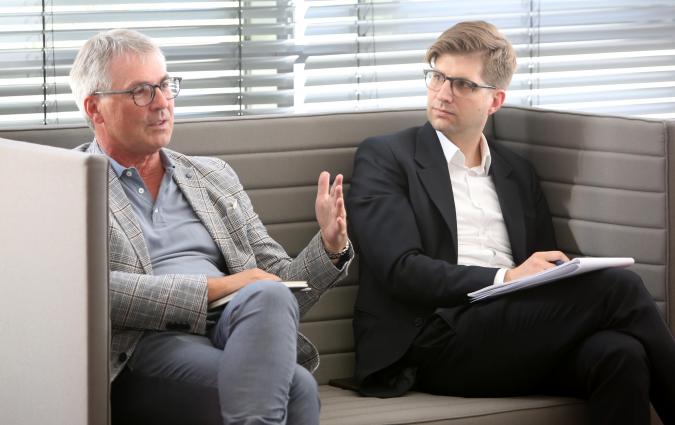In this piece
News from a different league: the rise of the digital party press in Austria

A newspaper seller looks at his stand in Vienna. | REUTERS/Heinz-Peter Bader
In this piece
To say that Austrian politics has been colourful over the past couple of years would be an understatement. But what unfolded in October 2021 was a political drama in full technicolour: Chancellor Sebastian Kurz stepped down following raids in relation to accusations he was involved in paying a newspaper to publish polls with skewed data that made him appear more popular.
Kurz continues to deny the allegations, but in the months following the scandal he has upgraded his "break" from politics to a full resignation. Alongside him, several other ministers and key government players have stepped aside.
Meanwhile thousands of ordinary Austrians are aggressively demonstrating in the streets against COVID-19 restrictions, some of them outside newsrooms. Trust in news is shaken not just amongst anti-vaxxers; the scandal sparked a vigorous discussion in Austrian media circles about impartiality, ethics and the corruption of the free press.
According to a Gallup poll in the first weeks of October 2021, most Austrians do not expect the media to report in a neutral way.
It’s in this context that a new development is unfolding in Austria’s media landscape: the digital return of the party press and a rise of politically-biased alternative media outlets.
At first glance, these new competitors for the attention of audiences look like traditional news outlets. It only takes a few clicks to figure out that an outlet like kontrast.at is funded and run by the Social Democrats (SPÖ), that zur-sache.at is funded and run by the conservatives (ÖVP) or that YouTube channel FPÖ TV is, you guessed it, run by the far right’s FPÖ.
The Green Party has announced plans to launch their own news platform, too. And the liberal Neos party began advertising a vacancy for an editor in chief this month. At this rate, every party in Austria’s parliament will probably run a news platform by the end of this year.
FPÖ can also rely on digital outlets like unzensuriert.at, which is not officially run by the party, but with strong personnel and content-related connections.
Similar in tone but with no direct ownership are “alternative” outlets like eXXpress (described as “ÖVP-near”) or the left-leaning Zack Zack, founded as the party mouthpiece of the now-defunct Jetzt political party. They’re so partisan in their approach that even mild-mannered chief editor of the Austria Press Agency (APA), Johannes Bruckenberger, describes them as the “Alpine Breitbarts”.
These outlets are very successful. According to social media monitoring tool Fanpage Karma, Kontrast.at was the second most-shared Austrian news platform on Facebook in the first two weeks of October 2021. FPÖ TV has the second most popular Austrian news channel on YouTube, and just half a year after launching, eXXpress ended 2021 with 2 million monthly unique clients (the Austrian measure of unique devices) – more than many of the established media outlets reach.
It’s worth paying attention to figures like these when the Digital News Report 2021 reports 48% of Austrians say they get their news from social media, and one out of three prefer news that shares their point of view. That’s what Zack Zack and company are delivering. “It has become harder to serve everyone,” said the chief editor of Austria’s biggest daily newspaper Krone, Klaus Herrmann.
Nevertheless, established media seem unimpressed, or at least they were when I interviewed three chief editors of Austria’s biggest news outlets for my paper about this trend. Should partisan media outlets be seen as normal competitors, I asked? "No, not really,” Bruckenberger said. He described Zack Zack and eXXpress as "platforms with an agenda", not news media in the traditional sense. "I wish them a long life, which always depends on their financiers.”
Matthias Schrom, chief editor of public service TV ORF, hopes they won’t be real competitors when it comes to trust, but adds: "I think that there is a certain percentage of people who prefer to just confirm their prejudices, which has never been easier to do than it is nowadays. These platforms definitely fulfil this function.”
In Herrmann’s opinion, established media shouldn’t even respond when the alternative media outlets launch attacks on the traditional press. "They are no competitors,” he told me. "They do something different; we play in a different league.”
Their outlook isn’t shared by Senior Research Fellow Benjamin Toff, who leads the Trust in News Project at the Reuters Institute. Unless there is a “growing awareness” and labelling of partisan media outlets, Toff advises that they should be “seen as real competitors”. His reasoning is simple: “From an audience perspective, they are just seen as different providers of news and information.”
To see the data Klaus collected about alternative media in Austria, and hear how the editors of these partisan sites described their aims during interviews, download the full paper below.




